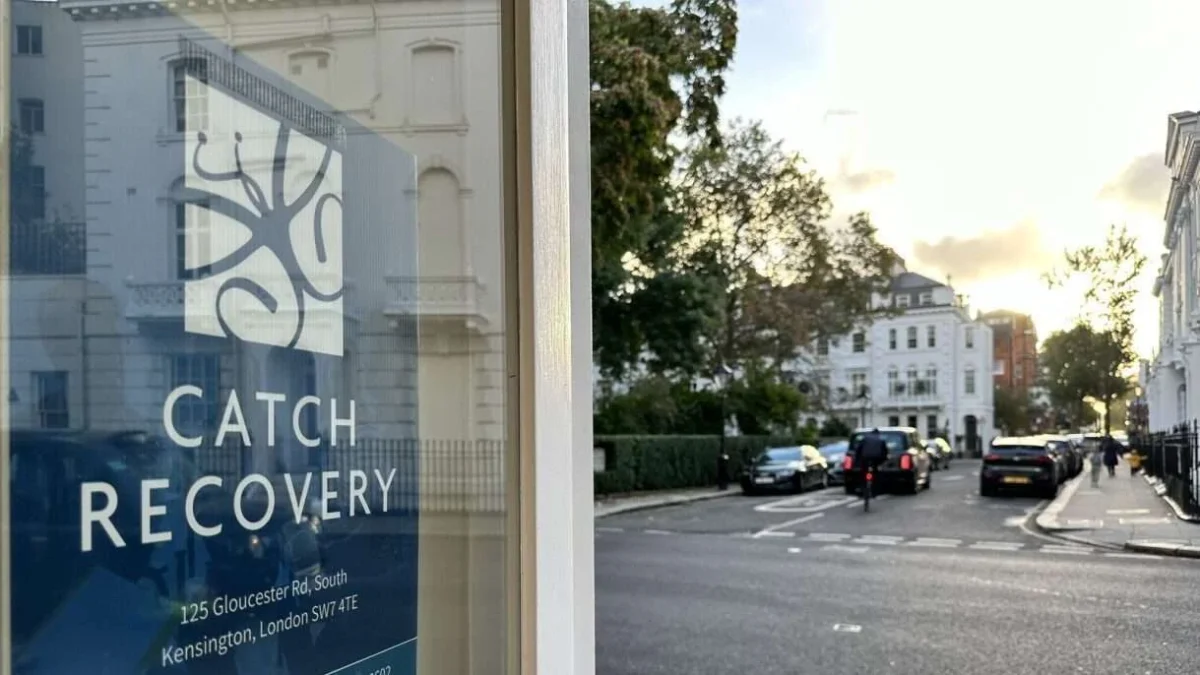
Cognitive Behavioural Therapy for Addiction
Cognitive Behavioural Therapy (CBT) is an effective therapy for addiction, and forms a significant part of our treatment approach. At CATCH Recovery, our highly skilled therapists will use CBT techniques to help you explore your thoughts and feelings, and find healthy ways to cope with stress and anxiety.
We offer:
- Individual Therapy
- Group Therapy
- Phone and Online Coaching
- Consultation Team
Contact us today to learn more about the Cognitive Behavioural Therapy (CBT) services we offer and find the right support for your situation. You don’t have to go through this alone—our experienced therapists are here to help.
Table of Contents
What is Cognitive Behavioural Therapy?
Cognitive Behavioural Therapy (CBT) is a type of talking therapy based on the idea that thoughts, emotions, and behaviour are all linked and have a direct influence on one another.
In addiction treatment, the goal of CBT is to help you identify and challenge any negative thoughts or beliefs that might be driving your addictive behaviour so that you can intervene and break the cycle.
CBT will help you to develop coping skills and techniques to manage any triggers for your addiction, find ways to improve your overall emotional well-being and enable you to become more consciously aware of the choices that you make.
One particularly important feature of cognitive behavioural therapy is homework. You and your therapist will plan and agree on exercises for you to practise outside of your therapy sessions. You will then report back on how they went, and discuss any difficulties at your next session. Doing the homework is a major factor in determining how successful the CBT will be. 1
We work with licensed CBT specialists who are ready to help you improve your long-term recovery chances through this tested talking therapy.
The Benefits of CBT in Addiction Treatment
Cognitive behavioural therapy is an effective and evidence-based treatment for addiction. It offers numerous benefits that can help you make long-term changes to your behaviour and lifestyle.
During CBT sessions, you will meet with your therapist and learn how to:
This improved self-awareness will help you to make different choices in the future, reducing the chance of relapse.
In addition, CBT has been proven to reduce stress and anxiety, which can be a major factor in addiction. By helping you reduce your stress levels, you will be better able to manage the symptoms of your addiction.

Download Brochure
How Does CBT Work?
Cognitive behavioural therapy helps you to look at, and ultimately change, how you think, feel, and behave. 2
It works on the basis that thoughts affect feelings and that how you feel will influence what you decide to do.
For example, thinking that someone is ignoring you at a social event could make you feel sad and anxious, which might result in your action to go home and hide away.
In this way, the negative thought has impacted how you feel, resulting in an action you might otherwise not have taken.
What Does the Research Say?
Cognitive behavioural therapy has been proven to be an effective treatment for addiction. The use of CBT is based on decades of research and clinical practice, and it has consistently been shown to be beneficial.
In one study, patients with substance use disorder took part in a programme of intensive CBT group therapy for four months. At the end of it, the results showed vast improvements in their emotional well-being, with reduced anxiety, depression and feelings of hopelessness, and increased self-esteem and hope. 3
Another study concluded that CBT was a promising treatment for internet addictions. 6
Further research has shown that not only does CBT promote recovery, but it is effective in both group settings and individual sessions. 4, 5

CBT Exercises and Techniques
Cognitive restructuring is a core technique used in cognitive behavioural therapy to change unhelpful thought patterns. It involves examining and challenging irrational thoughts and replacing them with more objective and realistic thinking. A collaborative process between you and your therapist, it will help you to develop more accurate and balanced thinking.
The CATCH Recovery team uses various strategies to help clients change their thought patterns and achieve long-term recovery. Your therapist is likely to use some of the following techniques or exercises during your counselling sessions, many of which will be useful to adopt even after you finish treatment with us.
-
Thought records
By keeping track of your thoughts, you’ll learn how to spot and challenge any unhelpful or distorted thought patterns. Thought records are usually written down, and your therapist may provide you with some templates to fill in.
-
Activity scheduling
You’ll be encouraged to plan and take part in different activities to improve your mood and find ways to feel more fulfilled.
-
Activity scheduling
You’ll be encouraged to plan and take part in different activities to improve your mood and find ways to feel more fulfilled.
-
Relaxation techniques
These may include deep breathing exercises, meditation practices, gradual muscle relaxation, or some guided imagery to reduce your stress levels.
-
Role-playing
You and your therapist might practise different ways of thinking and behaving, with each of you taking on a role and acting it out.
-
Socratic questioning
This is a particular type of CBT technique which uses questions to challenge your beliefs and help you explore things from different perspectives.
-
Graded task assignments
You’ll discuss how to break seemingly overwhelming tasks down into smaller, more manageable steps, so that you can work towards doing them with less anxiety.
-
Assertiveness training
Learning and practising assertive communication skills so that you can express yourself more confidently.
-
Thought stopping
Learning how you can interrupt negative thought spirals.
-
Self-monitoring
Learning to track your thoughts, emotions, and behaviours to identify patterns.
-
Goal setting
Devising achievable goals to work towards.
Negative Automatic Thoughts
A key part of CBT will be identifying any negative automatic thoughts which might be contributing to your addiction. 7
Negative automatic thoughts tend to happen involuntarily, and can often be irrational or self-defeating. They often reveal a lot about our core beliefs, and how we think about ourselves internally. Your therapist will be able to help you uncover yours.
An example of a negative automatic thought might be “I can’t cope” or “nobody likes me”. You may not be aware that this is what you are thinking, but as you learn to recognise these thoughts, you’ll be better able to challenge them.
Working with your therapist, this is likely to involve weighing up the evidence for and against a thought, and then taking an objective view as to whether or not the thought is accurate.
Advantages of CBT
Everyone’s experience will be different, but many people find CBT useful because it:
- tends to be shorter in length than other types of therapy.
- has a more structured format which means it can be delivered individually, in groups, and online.
- is a collaborative therapy where you and your therapist work together to decide the exercises.
- tends to be pragmatic and problem solving in approach.
- has more of a focus on the present day than other therapies.
- can equip you with practical strategies and coping mechanisms to take with you after you finish treatment.
However, CBT may not be suitable for everyone, particularly if a person has complex mental health issues. In addition, some people feel that CBT focuses too much on the present and overlooks potential underlying issues such as difficult childhood experiences. Others complain that the homework elements are too time intensive, and that people drop out of treatment because the therapy requires too much commitment.

Get Help Today
Our Approach at CATCH
At CATCH Recovery, we believe that cognitive behavioural therapy is a vital component for long-term recovery. Our approach to CBT-based addiction therapy is informed by decades of research and evidence-based practices. We combine CBT techniques with a holistic, individualised approach to help you manage your substance use disorder or other behavioural addictions.
We Use CBT to Treat:
Our therapists are highly trained in CBT, and we understand how powerful this type of therapy can be in tackling the underlying issues that contribute to addictive behaviours. Our therapists use a range of strategies to help you recover from your addiction and start living a more fulfilling life.
We believe that the most effective addiction treatment is tailored to suit each individual. Once you call us for the initial screening, we will keep working together to create the optimal counselling programme to meet your needs.
Featured CBT Specialists


José is a Counsellor and Psychotherapist holding an MSc in Counselling and several qualifications in Addiction Counselling. He has been working in the field of addiction and associated disorders since 2003 gaining extensive experience working with compulsive behaviours, mental health and substance addictions.
Over the years José has worked primarily in leading residential treatment facilities as a Counsellor, Senior Counsellor, Head Therapist and Clinical Manager overseeing teams of multidisciplinary clinicians. He has worked individually with clients over extended periods of time affording the opportunity for long term and sustainable recovery and change.
As an integrative therapist with long experience working in the addiction and compulsive behaviours’ field, José provides a range of different models and concepts of therapy, such as CBT, CAT, MI, Relapse Prevention, Psychodynamic, Systemic and Gestalt. He facilitates psycho-educational workshops and interpersonal psychotherapy groups as well as individual therapy, supervision, training, and clinical management.
José is fluent in English, Portuguese, French, and Spanish. He is also involved in Communitarian work, Politics and Sports


BSc, MB, BS, MRCGP, FDSc CSAT3 (Asia Pacific)
Seamus works online for Catch Recovery London and Castle Craig as an aftercare teletherapist.
Seamus trained as a doctor at the University of London and then became a GP in the Royal Air Force for 22 years, running his own medical centres on a variety of flying stations both in the UK and abroad in conflict zones.
He developed an interest in addiction and trauma with many of his patients predominantly suffering from addictions to alcohol, prescription drugs and other compulsive behaviours around food, work, control, and co-dependence.
On retiring from the RAF in 2006 he completed a degree in Addiction Counselling at Bath University, and worked in a prison setting, delivering a 12 Step daycare programme. He has also worked with addicted health professionals in a therapeutic community, developing a 12 Step recovery programme with a CBT-based mindfulness and acceptance approach.
In the last ten years he has worked within Asia; running an intensive Addiction Outpatient Program in Hong Kong and in residential rehabs in Malaysia and Thailand as well as being a programme director at a treatment centre in Borneo.


Paul has a wealth of experience in psychological intervention, having worked in various multi-disciplinary work settings, including NHS IAPT services (Improving Access to Psychological Therapies), alcohol and drug misuse services, renowned private residential rehabs and prisons. He has also had a successful private practice in Harley Street and the Home Counties and now works from Guildford in Surrey, Horsham in West Sussex, and online.
He is experienced in working with a variety of different issues, including but not limited to substance misuse, gambling, sex addiction, porn addiction, internet addiction and eating disorders. He has worked with problems relating to anxiety, depression, stress, abuse, relationships, work, self-harm, and OCD.
Paul applies various contemporary research and evidence-based therapeutic models, including CBT (Cognitive Behavioural Therapy), MET (Motivational Enhancement Therapy) and Humanistic Person Centred Therapy to help facilitate change and help people with various issues to live more balanced
lives.
Paul is a BACP-accredited Counsellor/Psychotherapist who draws on his experience and knowledge to provide therapy in a safe, supportive and confidential manner. Paul believes in the therapeutic relationship between the counsellor and client to be key, built on trust so that a shared open alliance
can form.


Anita Chellamah is a counsellor specialising in Addiction and Developmental Trauma.
After an active career in the arts, Anita hit rock bottom due to her drug and alcohol addiction. After changing her life, becoming clean and sober she re-learned to live again in recovery. This is what sparked her passion for the work she does, in the knowledge that confronting and recovering from illness
of addiction and childhood trauma is possible.
She qualified as a counsellor in 1998 and has worked with addicts and families affected by addiction in many different treatment settings delivering 1-1 sessions as well as groups working with DBT, trauma-focused tools and the 12 Step framework.
Throughout her work she has explored addictive patterns, processes and how they present in various addictions such as alcohol, drugs, love addiction and co-dependency.
The Book Alcoholics Anonymous was going to be initially called “ A Way Out” and she believes strongly that there is a way out, to be able to live a life filled with purpose, hope, and choice, whilst also living in the reality of life on life’s terms.
Developing Coping Skills and Resilience Through CBT
Cognitive behavioural therapy is an evidence-based addiction treatment that can help you build coping skills and resilience. Through structured exercises, CBT helps you to identify and challenge any negative thought patterns that are underpinning your addictive behaviour.
By replacing unhelpful thoughts with more positive ones, you can reduce the intensity of your cravings and learn healthier ways to cope with stress. These new skills will help you build a healthier lifestyle and reduce the risk of relapse.
Start Your Recovery Journey Today
At CATCH Recovery, we believe in providing each of our clients with personalised treatment. We will begin your programme with a free screening and after that, we can discuss your treatment plan. Our approach uses both individual counselling and support groups to help your recovery.
Get the Support You Need to Overcome Addiction: Contact CATCH Recovery Today
-
References
- Decker SE, Kiluk BD, Frankforter T, Babuscio T, Nich C, Carroll KM. Just showing up is not enough: homework adherence and outcome in cognitive-behavioural therapy for cocaine dependence.
- British Association for Counselling and Psychotherapy. What is cognitive behavioural therapy (CBT)?
- Bador K, Kerekes N. Evaluation of an Integrated Intensive Cognitive Behavioral Therapy Treatment Within Addiction Care.
- McHugh RK, Hearon BA, Otto MW. Cognitive behavioural therapy for substance use disorders.
- Magill M, Ray LA. Cognitive-behavioural treatment with adult alcohol and illicit drug users: a meta-analysis of randomised controlled trials
- Wölfling K, Müller KW, Dreier M, et al. Efficacy of short-term treatment of internet and computer game addiction: a randomised clinical trial.
- Psychology Today. How Can We Apply CBT to Addiction Treatment? [Accessed 16 August 2024].